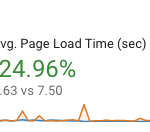Your Website Needs a Strong SEO Partner
What is SEO and why should I care?
While most website owners are familiar with the concept of search engine optimization (SEO), most that I have spoken to have an incomplete view of what it can do and its importance overall.
My definition of SEO:

- Avoiding or fixing technical errors that can prevent search engines from properly indexing your content. Examples include things like canonical URLs, duplicate content, mobile related issues, multiple site or language realted, and avoiding or working around flash/JavaScript, which present content that search engines can’t see.
- Structuring and creating content on your site that sends the proper signals to search engines, and is tailored to the keywords (especially long tail keywords) that are most effective for your site.
- Building links, managing social presences, and establishing relationships with other websites that will both drive traffic and give your site the necessary link authority to perform on competitive keywords.
 Why SEO should be a crucial pillar for any website
Why SEO should be a crucial pillar for any website
Many of the companies I have worked with have already built and launched their website by the time they start looking to ‘add SEO’ to their website. This is not the approach I recommend – SEO is much more effective when it is integrated in the project from the start, and everyone involved in the web project should have at least a basic understanding of how they can contribute to the site’s organic success.
- Top-heavy rewards for top listings – There have been many studies on the click through rate (CTR) for each position on a search engine results page (SERP). They all show that the top organic listing gets by far the most clicks, while the click volume drops off quickly as you move down the page. The rewards are well worth the effort to get a top ranking.
- SEO isn’t easy to tack on – your site’s organic performance depends just as much on the internal link structure and information architecture as it does on the content of the pages. Improvements to a site’s internal link structure can have big returns in organic performance.
- Being a little better can earn big dividends – a Google SERP is a representation of all the sites that are competing for a given keyword, ranked by Google in order of relevance. If you can convince Google that you are a little bit better than your competitors, you can get more top rankings and really rake in the traffic. In my experience, the best way to do this is to make sure you are hitting all the ranking factors that Google cares about as much as possible.
- An effective consulting relationship can be highly productive. Even company is as large as eBay, Amazon, and Sears have hired SEO consultants to help with strategy, so even if you have a large company, chances are there are still important things you can learn from the right SEO consultant.
Many companies have been burned before
Anyone who has had a website for a while is familiar with the steady stream of SEO solicitation emails that come through the door. Most of the companies I have worked with have had at least one bad SEO experience in their past, which has made them cautious/cynical to varying degrees. It is my hope that the questions below can help site owners know what to ask about and avoid the many poor quality, chop shop type SEO companies that are out there.
10 questions to ask a potential SEO partner
I recommend interviewing at least three SEO companies, so you can compare their answers and prices.
- Website platform expertise. Unless you have built your own website with a programming language like ASP or.NET, chances are your site is built on one of the hundreds of platforms that make it easier to manage a website. We specialize in NetSuite driven websites, but other popular platforms include OsCommerce, Magento, and Drupal. The platform is where the rubber meets the road, and it often takes expertise to properly implement SEO best practices. We have discovered dozens of bugs and issues with the NetSuite platform that can potentially harm organic performance if not dealt with properly.
- Ask for a sample of the documents that they usually provide to their clients for the project they are recommending. This can be a anonymized and have two rows of data, but it’s well worth pushing to get this. some SEOs will simply hand over a big spreadsheet with lots of tabs, with the raw output from one SEO tool or another. You want a company that will help you understand the results and implement the fixes, not just dump a lot of data on you.
- What is the estimated time frame for the project? Do they have a project plan, and will there be regular or ongoing follow-up calls? some SEO audits consist of little more than delivery of a report. Our SEO projects typically last from a few weeks to a few months, and we use web-based project management tools and weekly follow-up calls to stay on track.
- Who will be doing the work? Most SEO companies have highly knowledgable owners (who usually do the closing), with lower-level employees doing most of the work. Subtlety and an attention to detail are important in SEO projects, and this often suffers when tasks are performed by rote with semi automated tools.
- Ask how much of the data they will provide you is reviewed by humans, and what audit steps they perform. If they don’t review and clean up their data, that means you have to spend your time doing it. I have gone through SEO reports by other companies that had upwards of 90% false positives – a few examples:
- Duplicate content reports that show two URLs that have the same content, but they are images (which really isn’t worth fixing).
- Incorrectly identified canonical issues that were actually something else, or not a problem at all.
- Software generated lists of pages supposedly missing H1 tag, but they actually weren’t.
I could go on, but you get the point… SEO is often about dealing with large amounts of data, and if that data has lots of errors in it, you will be wasting a lot of time, or possibly trying to fix something that isn’t broken.
- Ask for a high level list of the things they check for – do they have a list of things that they do not check for?
- What is their approach to teaching? At Fourth Wave Consulting, we are big believers in sharing as much knowledge as possible. The basics of SEO are straightforward and can be learned by anyone, and much of the work is time intensive. We want our clients to do as much of the work as they can, freeing us to do the most difficult, creative, and valuable tasks.
- Ask for case studies or examples of long term SEO relationships. The hallmark of a good SEO is the ability to grow a site’s organic traffic over time, while avoiding penalties and problems from algorithm changes, like Panda or Penguin. short term gains from shady tactics can come back to haunt you later.
- What is the scope of the proposed project? What tasks will they be performing? Which tasks are you expected to do? Are follow-up calls and questions included?
- Have they had sites hit by Panda or Penguin? How did they fix it? If they had a high number of their clients affected, they might try to avoid telling you a hard number.


Fourth Wave consulting offers a free hour of consulting for website owners looking to improve their organic performance. This gives us a chance to get to know you and allows you to ask about anything you like.
More from Fourth Wave
David Norris
Latest posts by David Norris (see all)
- NetSuite Announces Plans to End Promotion Functionality for Site Builder - January 16, 2020
- Most NetSuite Websites Are No Longer Tracking Safari Conversions for Adwords - November 20, 2017
- Make Your NetSuite Site Builder Site Secure – HTTPS Throughout - May 28, 2017
- An Introduction to Automating XML Sitemaps for NetSuite Companies - November 13, 2016
- An Introduction to NetSuite’s Reference Checkout & My Account Bundles - April 18, 2016






